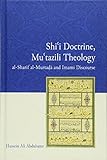Shi'i Doctrine, Mu'tazili Theology : al-Sharif al-Murtada and Imami Discourse / Hussein Ali Abdulsater.
Material type: TextPublisher: Edinburgh : Edinburgh University Press, [2022]Copyright date: ©2017Description: 1 online resource (256 p.)Content type:
TextPublisher: Edinburgh : Edinburgh University Press, [2022]Copyright date: ©2017Description: 1 online resource (256 p.)Content type: - 9781474404402
- 9781474404419
- BP88.S5 A23 2017
- online - DeGruyter
| Item type | Current library | Call number | URL | Status | Notes | Barcode | |
|---|---|---|---|---|---|---|---|
 eBook
eBook
|
Biblioteca "Angelicum" Pont. Univ. S.Tommaso d'Aquino Nuvola online | online - DeGruyter (Browse shelf(Opens below)) | Online access | Not for loan (Accesso limitato) | Accesso per gli utenti autorizzati / Access for authorized users | (dgr)9781474404419 |
Frontmatter -- Contents -- Acknowledgements -- Introduction -- 1 Life and Works -- 2 God and the World -- 3 Moral Theory and Divine Justice -- 4 Humans and the Origins of Religious Experience -- 5 The Imama and the Need for Moral Leadership -- 6 Prophethood and the Value of Divine Guidance -- Conclusion -- Bibliography -- Index
restricted access online access with authorization star
http://purl.org/coar/access_right/c_16ec
Examines the critical turn that shaped Imami Shi'ism in the 10th and 11th centuries God is not free to act; He is bound by human ethics. To be just, He must create an individual of perfect intellect and infallible morality. People are obligated to submit to this person; otherwise eternal damnation awaits them.While these claims may be interpreted as an affront to God’s power, an insult to human judgment and a justification for despotism, Shiʿi Muslims in the eleventh century eagerly adopted them in their attempts to forge a ‘rational’ religious discourse. They utilized everything from literary studies and political theory to natural philosophy and metaphysical speculation in support of this project. This book presents the contribution of al-Sharīf al-Murtaḍā (d. 1044) of Baghdad, the thinker most responsible for this irreversible change, which remains central to Imami identity. It analyzes his intellectual project and establishes the dynamic context which prompted him to pour the old wine of Shiʿi doctrine into the new wineskin of systematic Muʿtazili theology. Key FeaturesComprehensive coverage of al-Murtaḍā’s enormous oeuvre (running to several thousand pages) and diversity (spanning virtually all contemporary fields of knowledge)A meticulous engagement with long and dense theoretical texts that are either in manuscript form or poorly editedAn orderly presentation that equips readers with an overall understanding of Shiʿi theology in its main phases while preserving the profundity of analysisThe study of a little-known author whose views, nonetheless, are still a major influence for Shiʿi Muslims
Mode of access: Internet via World Wide Web.
In English.
Description based on online resource; title from PDF title page (publisher's Web site, viewed 29. Jun 2022)


